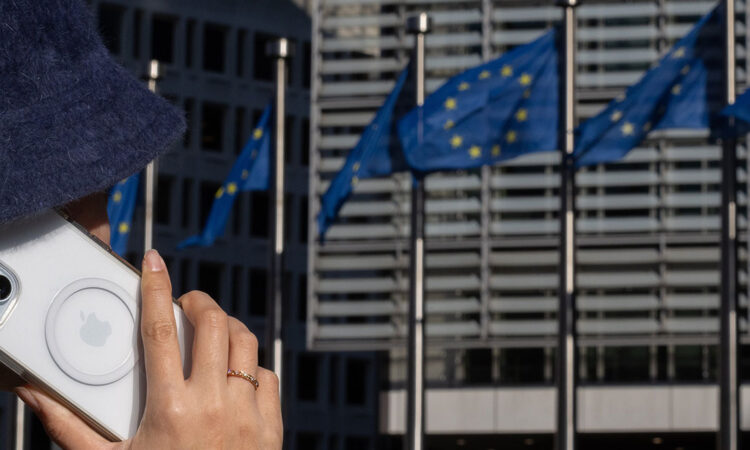
Top antitrust officials from both sides of the Atlantic recently convened for the EU–US Joint Technology Competition Policy Dialogue to, in the words of the Federal Trade Commission, “continue work on cooperation in ensuring and promoting fair competition in the digital economy.” Such conversations aren’t inherently alarming, given the global consequences of Big Tech’s growing power, but this is the fourth such formal, high-level meeting to occur since 2021. Indeed, given the anti-market proclivities of the Biden administration, it appears that the U.S. is set on pursuing “convergence” with European Union policy, which has long been hostile to American business.
The concord between United States and EU regulators on reining in Big Tech is relatively recent. Since 1991, the U.S. and EU have honored a broad commitment to antitrust collaboration. For example, in 1998, when rival oil-drilling-service companies Halliburton and Dresser merged, both European and American antitrust enforcers scrutinized the deal. The 1991 commitment to collaboration allowed for the timely communication and consideration of divestments imposed by both the Justice Department and the European Commission, which helped clear the merger without further delay or contradictory remedies. Similarly, the 2005 Reuters-Telerate merger prompted scrutiny from both the Department of Justice and the European Commission about the potential of entrenching concentration in the market for data platforms. But collaboration between Washington and Brussels focused on finding an acceptable remedy to this mutual concern. And the list of EU–U.S. collaborations continues.
The United States has diverged from Europe when laws clashed. For years, the U.S. has sought to protect American tech firms against Europe’s aggressive lawsuits and sweeping legislation, such as the General Data Protection Regulation and the Digital Markets Act. And in 2001, the U.S. heavily criticized European Commission scrutiny of the GE–Honeywell merger. The Justice Department even proudly touted its reasons for diverging with the EU. And with revisions to the 1968 Merger Guidelines and the courts’ embrace of the consumer-welfare standard, American antitrust enforcers no longer considered conglomerate mergers anticompetitive, meaning that many theories of harm brought by EU regulators wouldn’t pass judicial scrutiny in the U.S.
The Biden administration has sharply broken with these practices, however. It has made clear its intentions to pursue greater policy alignment with the EU, which means discarding domestic legal and economic precedent and, thus, leaving American businesses more vulnerable to attack from overseas. This drastic shift is epitomized by the rise of Lina Khan, the progressive chair of the FTC, who has advanced arbitrary and aggressive enforcement. Further, though the Biden administration once criticized the Digital Markets Act as protectionist for targeting American tech companies to the benefit of European competitors, its attorneys in Europe are now aiding EU officials in enforcing the law on U.S. businesses.
Proponents of EU–U.S. convergence argue that it is merely a continuation of principled cooperation with Europe. This is misleading. Previous cooperation concentrated on honing laws on both sides of the Atlantic that were already broadly consonant, not unilaterally suborning America’s antitrust priorities to those of Brussels.
In contrast with the history of principled cooperation and disagreement, at the latest high-profile meeting between American and European officials, Jonathan Kanter, assistant attorney general for the Justice Department’s Antitrust Division, adopted the EU’s talking points, expressing American worries that “the growth of data monopolies and the rapid expansion of artificial intelligence expand the competitive threats we face from dominant digital gatekeepers.” Taking on “dominant digital gatekeepers” is a top priority of the EU’s Digital Markets Act—a policy with no American equivalent.
In a speech delivered in 2016, then FTC commissioner Maureen Ohlhausen prophetically pinpointed the reason why Europe has arrived at an essentially different understanding of antitrust enforcement. It believes that a “competitive market” is “one where economic . . . power is dissipated among many.” American antitrust jurisprudence, by contrast, does not recognize the need to dissipate power among many companies. Nor is it even confident that antitrust enforcement could effectively do so.
Rather, U.S. law is focused on maximizing benefits to consumers, which often involves allowing some companies to grow large to achieve economies of scale. It is also cautious of using state power to micromanage competition. Additionally, one cannot help but notice that the U.S. currently dominates the digital-platform industry, whereas Europe has yet to produce a sizable or substantive competitor.
To be clear, the EU is targeting large American tech firms not just because of their size but also because they are American. U.S. antitrust leaders should turn away from European doctrine, which was built to subvert American enterprise, and return to our nation’s legal and economic tradition, which prioritizes consumer interests. Genuine cooperation between America and Europe would, as it did in the past, recognize and respect our fundamentally different approaches to law and economics.
Photo by Meng Dingbo/Xinhua via Getty Images
City Journal is a publication of the Manhattan Institute for Policy Research (MI), a leading free-market think tank. Are you interested in supporting the magazine? As a 501(c)(3) nonprofit, donations in support of MI and City Journal are fully tax-deductible as provided by law (EIN #13-2912529).






